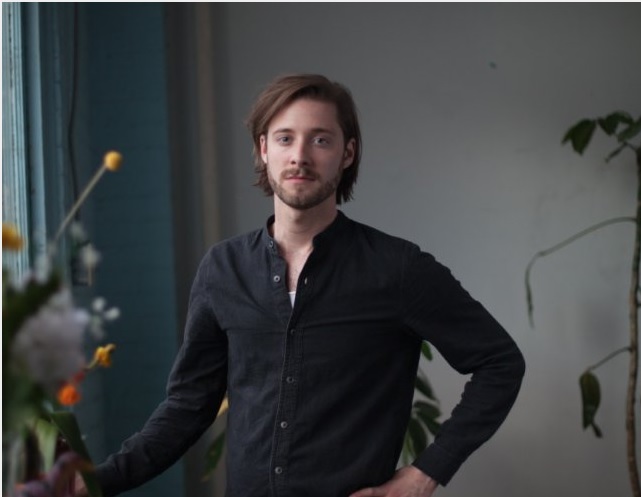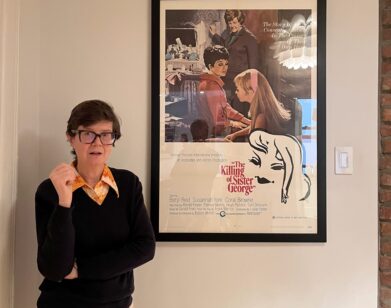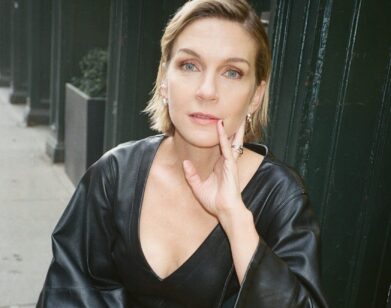Discovery: Stephen Dunn
CONNOR JESSUP AS OSCAR IN CLOSET MONSTER; STEPHEN DUNN. IMAGES COURTESY THE MARRAKECH INTERNATIONAL FILM FESTIVAL
With just one feature under his belt, Canadian writer-director Stephen Dunn has already articulated his voice as a filmmaker. His debut, Closet Monster, a studied bildungsroman/coming-out narrative that upends genre conventions to include fantasy, surrealism, drama, comedy, and body-horror devices, fleshes out the psychological anguish of 18-year-old Oscar (American Crime‘s Connor Jessup), an aspiring special effects make-up artist grappling with his emerging sexuality, repressed family trauma, and his yearn to escape the Canadian suburbs. Dunn creates a deft and nuanced character portrait, as Oscar confers with his best friend, Gemma (Sofia Banzhaf), his pet hamster and confidant, Buffy (voiced by Isabella Rossellini), and becomes enamored with an Adonis-like co-worker at his after school job, Wilder (Aliocha Schneider).
Closet Monster nabbed the Canadian Feature Film award at this year’s Toronto International Film Festival and Dunn is the first artist-in-residence at TIFF’s Len Blum Residency. Interview caught up with him at the Marrakech International Film Festival, where Closet Monster screened in competition, earlier this month. The film is slated for release sometime next year.
AGE: 26
PROVENANCE: St. John’s, Newfoundland, Canada
MAKING THIS FILM: I didn’t really decide. [laughs] It’s cliché, I guess, to say that. But it’s the film I just had to make. Ultimately, it’s pretty personal. I had to make it for myself to process aspects of my life that I’ll never get closure to. This is kind of the only way that I can take control of that stuff. I went to the Canadian Film Centre, which is like the AFI of Canada, and started developing the script there and made a teaser and stuff like that. I brought it out, and messaged the first production company that I wanted to work with, which was Rhombus. Within six months or eight months of giving it to them, we were shooting. It was relatively fast, even though I just came out of film school.
BEGINNINGS: I made a lot of movies, growing up as a kid. Just fun projects. I went to university and did a year of creative writing in England—that’s not really even a year off, but it was more self-exploration and a period of time that I used to do a lot of research and writing. I decided I would go into film during that stretch. I wasn’t sure if I wanted to go into acting or filmmaking, because [acting’s] my background.
THE TALKING HAMSTER: It was always a part of the film. She is this maternal figure. She’s given to him in the moment when his parents divorced, so it’s kind of like a surrogate parent. But she ultimately becomes his conscience, his spirit animal. What happens, I think, with a lot of kids who are faced with traumatizing or difficult circumstances: It stunts you in certain areas of development, but it also catapults you into adulthood far beyond your years. Oscar is sexually stunted because he witnesses this crime that is related to his sexuality. But the hamster is really the epitome of his maturity or [his] level of control. We also referred to Buffy as his Golem, who he can talk to and open up with. She’s actually just a projection of his internal feelings. But, his personality is segregated in that moment. Buffy is this all-knowing, conscious, free speaker, whereas he is more repressed.
CASTING: Connor sort of incepted my brain. I wrote the entire script in the University of Toronto Library, this old Hogwarts-y looking building. Every week a bunch of nerds would come in and play this board game in the same room that I was writing in. Connor was one of those nerds who was coming in and playing this game. I kind of wrote the role for him, I guess? A little bit. I always envisioned him as the character. I’m a big fan of his work, he’s a really smart kid, and a really talented actor, so we offered it to him and he was very excited about it.
Aliocha was a very difficult role to find. He’s the epitome of a first love, that kind of infatuation that comes with that. He’s actually quite an incredible performer, especially in these softer moments when he’s not being idealized, during the kiss scene, and after Connor wakes up after having thrown up. I was kind of blown away by his performance because in these scenes he was able to flex his muscles and be more vulnerable and be more natural. I auditioned a ton of people. He was the last character to be cast in the film, but I came across him through my agent and we Skyped. He sent in a tape and he had a little kitten that he was doing the audition with, because he was doing the scene when he lifts Buffy and says, “She has balls.” And I was like, “This guy’s hilarious,” and then I met him in Montreal and he came over to my friends’ house and just picked up a banjo and started playing it, and had never played a banjo before. I was like, “This guy is so cool!”
[For Isabella], we’d already shot the film, and originally the hamster was the Siri voice, like the iPhone. It wasn’t doing it for me. I wasn’t connecting the same way. I realized that I wanted someone. I wanted a voice that was maternal and loving, but also had that unique brand of humor. I was a really big fan of her Green Porno. I just pitched it. We had no money, we had already finished shooting so we had nothing left. But, my producer had worked with her before on Enemy, the Denis Villeneuve film. I just pitched it to him, thinking that he’d hate the idea. But, instead he loved the idea and we sent her the script and she got back to us right away and was like, “Of course I would play the animal star!”
STYLE: There was never a version of this that didn’t have a talking hamster and didn’t have this body work. I kind of work backwards when I make films. I get one image and base an entire film around it. So for this, the image that I had was of this man pulling some form of internalized homophobia out of his stomach. I wanted to connect it to the elements of the fluttery, butterfly, burning feeling of strong love, and also fear. Those are very connected in this film. I wanted him to remove that from his stomach. I feel like it’s cubist filmmaking for me, [the] unfolding of the brain and allowing his internal fears and desires manifesting into a physical form. I’m not trying to implement a device or trying to do something different. It’s honestly just the way I do everything. Every film I make has these components.
WHAT’S NEXT: It’s about the Newfoundlanders settlement in the ’60s, when Newfoundland joined Canada. Fifty thousand people were forced to resettle from smaller islands and they weren’t given enough money to move and so they literally floated their homes across the Atlantic Ocean. My film is about a family that gets separated while they are floating the house.
CLOSET MONSTER WILL BE RELEASED IN 2016







